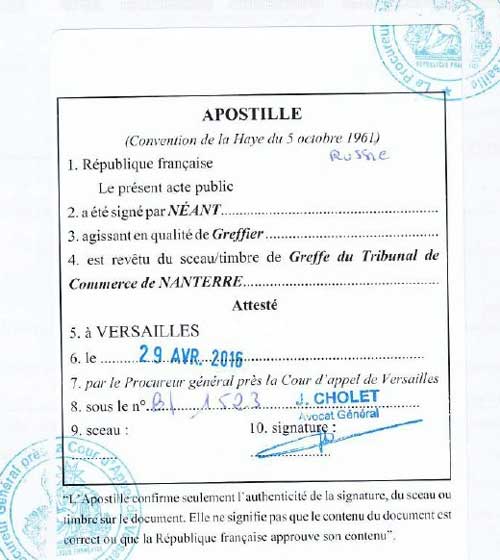Legalization makes documents suitable for use in another country. Documents that can be legalized include civil status documents, court orders and diplomas. Legalization shows that:
- the document was issued by a competent and expert authority.
- the signature, seal and/or stamp on the document are genuine.
- the document’s format is correct.
NB: The legalization requirement applies only to official, non-commercial documents.
There are the following procedures for legalizing documents:
- Consular legalization.
- Affixing the Apostille.
- Legalization with the Chamber of Commerce.
NB: Where a state is not a signatory to the Hague Convention, consular legalization is required. This is a more complicated procedure. In the majority of cases, legalization with the Chamber of Commerce is applicable to such business documents as contracts, bills, invoices.
Not always. On some other occasion, States may enter into agreements that completely eliminate the need to legalize documents for their recognition in these States.
An Apostille is simply the name for a specialized certificate, issued by the Secretary of State. The Apostille is attached to your original document to verify it is legitimate and authentic so it will be accepted in one of the other countries who are members of the Hague Apostille Convention.
Foreign documents certified with an apostille are recognized in all member countries of the Hague Convention and don’t require any other form of certification.
Common to apostille and consular legalization procedures is that they confirm the authenticity of an official document for submission to institutions in another country. However, they have many differences.
| Comparison criteria | Apostille | Consular legalization |
| Application | Between States that have signed the Hague Convention of 1961 | Between all other States, if at least one of them has not signed the Hague Convention of 1961 |
| Complexity of the procedure | Uncomplicated | Complicated |
| An appeal to the Consulate | Not demand | Demand |
| Usage of the legalized document | Can be used in any of the countries participating in the Hague Convention of 1961 | It can only be used in the country where the Consulate has legalized it |
Apostille and notarial certification have different functions: an apostille is required for the document to be licensed in another state, and a notarial certificate is required to confirm the authenticity of the document's details (for example, the translator's signature).
The Apostille Stamp is applied in the country of issue of the document.
This is the responsibility of the authority, which is determined by the countries that are parties to the Hague Convention of 1961.
You can determine the responsible authority for each country on the website of the Hague Convention of 1961.
- To apply to the competent state body that is carried out the Apostille Stamp.
- Translate the document with the apostille into the language of the state to which the document is sent.
NB: Make sure that your translation is certified.
Commercial contracts, invoices, customs, diplomatic and consular documents cannot be apostilled.
In accordance with international practice, there are a number of documents that are not subject to legalization. In particular, originals and copies of documents that have a photo on them.
The document itself must be in good condition; the seals and signatures on it must be readable. Laminated documents are not subject to apostillization.
For each state, you need to find the authorized state body separately. You can determine the responsible authority for each country on the website of the Hague Convention of 1961.
An Apostille (Certificate) is a square approximately 9cm long, usually stamped onto the reverse side of a single page public document.

The text of the apostille must contain the following details:
- Title «Apostille (Convention de la Haye du 5 octobre 1961)»
- Name of the state that issued the apostille
- Full name of the person who signed the document certified by the apostille
- Position of the person who signed the document certified by the apostille
- Name of the organization that issued the document
- Name of the government body which certified the document
- Name of the city where the apostille was applied
- Date of apostille
- Number of the apostille
- Seal of the body that issued the apostille
- Signature of the officer that issued the apostille
The apostille does not have an expiration date. However, it is important to understand that documents certified with an apostille have a validity period, so expired documents, even if they have an apostille stamp, may not be accepted in another state.
The text of the apostille must contain the following details:
- Title «Apostille (Convention de la Haye du 5 octobre 1961)»
- Name of the state that issued the apostille
- Full name of the person who signed the document certified by the apostille
- Position of the person who signed the document certified by the apostille
- Name of the organization that issued the document
- Name of the government body which certified the document
- Name of the city where the apostille was applied
- Date of apostille
- Number of the apostille
- Seal of the body that issued the apostille
- Signature of the officer that issued the apostille
Apostille for legalization of documents is used in countries that have signed the Hague Convention of 1961.
The list of these countries currently includes the following:
- Australia
- Austria
- Azerbaijan
- Albania
- Andorra
- Argentina
- Armenia
- Belarus
- Belgium
- Bulgaria
- Bosnia and Herzegovina
- Brazil
- The former Yugoslav Republic of Macedonia
- Hungary
- Venezuela
- Guyana
- Germany
- Greece
- Georgia
- Denmark
- Israel
- India
- Irish
- Iceland
- Spain
- Italy
- Kazakhstan
- Cyprus
- China
- Korea
- Costa-Rica
- Latvian
- Lithuania
- Luxembourg
- Mauritius
- Malta
- Morocco
- Mexico
- Monaco
- Netherlands
- New Zealand
- Norway
- Panama
- Paraguay
- Peru
- Poland
- Portugal
- Republic of Moldova
- Russian Federation
- Romania
- Serbia
- Slovakia
- Slovenia
- United Kingdom of Great Britain and Northern Ireland
- United States of America
- Suriname
- Tunisia
- Turkey
- Ukraine
- Uruguay
- Philippines
- Finland
- France
- Croatia
- Montenegro
- Czech Republic
- Chile
- Switzerland
- Sweden
- Ecuador
- Estonia
- South Africa
- Japan
Consular legalization is required if documents will be used in the territory of a nation, which is not a member of the Hague Convention. We can assist you with all five stages of consular legalization required to present and validate a document to a country that is not a member of the Hague Convention:
- Translation of the document into the destination country’s language
- Notarization of the translation
- Authentication of the document in the Ministry of Justice
- Authentication of the document in the Ministry of Foreign Affairs
- Authentication of the document at the consulate of the destination country
Commercial contracts, invoices, customs, diplomatic and consular documents are not subject is carried out apostille.
In accordance with international practice, there are a number of documents that are not subject to legalization. In particular, originals and copies of documents that have a photo on them.










































